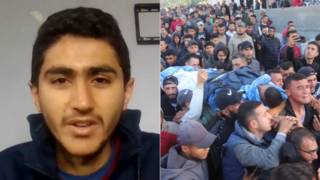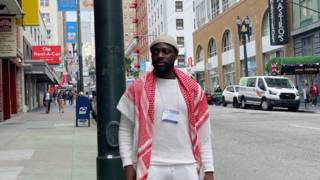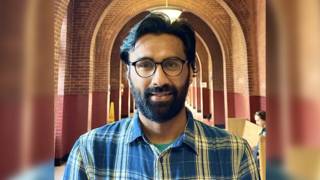
Guests
- Jade Lindgaardjournalist with the French news website Mediapart.
- Naomi KleinAuthor and journalist. She is blogging from Copenhagen for The Nation. Her recent articles include “Climate Rage.”
A leaked internal document from the United Nations Framework Convention on Climate Change states that current targets on emissions reductions from countries around the world will cause global temperatures to rise above two degrees Celsius. According to the UNFCCC document, current emissions reduction targets could lead to a three degree Celsius rise. We speak to French journalist Jade Lindgaard. [includes rush transcript]
Transcript
AMY GOODMAN: It’s Climate Countdown. We’re broadcasting live from Copenhagen. I’m Amy Goodman, and we’re joined right now by two journalists who have been covering very closely what’s happening here at the UN climate summit. We’re joined by Jade Lindgaard, who works for Mediapart, which is a media website. And Naomi Klein is back with us, who has been covering this climate summit extensively, also speaking at the Klimaforum across town and other civil society events. She is blogging for The Nation magazine at thenation.com and author of a number of books, including The Shock Doctrine.
We welcome you both to Democracy Now!
Jade Lindgaard, you have some breaking information about documents you’ve gotten here at the UN climate summit.
JADE LINDGAARD: Yeah, a very interesting leak today from the UNFCCC secretariat showing that the targets of reduction emissions that countries now, today, are putting on the table, these targets do not allow to stay below two degree rise in temperature. And they even say that it could lead us to a rise of three degree in temperature, which is, as we know, catastrophic if that ever happens.
AMY GOODMAN: Who is writing this?
JADE LINDGAARD: This is the UNFCCC. It’s not WWF, it’s not Greenpeace, it’s not Friends of the Earth. It’s the secretariat. And it’s an internal note they’re having and they have not yet published, and which is the basis of work for the current negotiations.
AMY GOODMAN: How did you get it?
JADE LINDGAARD: It’s a leak.
AMY GOODMAN: Naomi Klein, the significance of this?
NAOMI KLEIN: Well, sorry, I have to apologize for my voice, Amy. You guys made me come on. But it’s a metaphor, of course, because everybody’s complaining about how they’ve lost their voice in these proceedings.
This is so significant, because what this — this is the UN itself saying that if all of these countries go off and do what it is that they’re promising to do — and let’s remember, this is the US model, that rather than having targets that they must meet, they’ll be so-called national plans, so every country comes up with their own targets, and then they mash them together.
So they’ve done the math, and they’re saying if the US does what it’s saying it’s going to do, if the EU does what it’s going to do, then altogether the temperatures will increase by three degrees, which is catastrophic, because the target that they have set is two degrees, but even that, we’ve heard from Africa, would be a disaster.
JADE LINDGAARD: It’s even — it’s interesting because these figures that the UN is working on now, they are based on what — the pledges of countries. So it’s already based on what countries say they want to do. It’s not a business as usual. It’s already taking into account the effort that these countries have said they’re willing to comply to. And the truth is, it’s not enough at all. It’s not enough. So, in a way, these all negotiations and these disagreements these past few days around the two degree rise, they look like something — you know, it’s a bit like theater, because in the end it doesn’t really matter for the people. If it’s three degrees, it’s a nightmare for Africa and AOSIS.
AMY GOODMAN: And just for those who aren’t following these negotiations that closely, the UNFCCC stands for the United Nations Framework for Climate Change Convention. It’s the UN climate change conference that’s taking place here in Copenhagen.
I wanted to play a clip of Hillary Clinton’s news conference just a few minutes ago. She was just here in the room outside where we’re broadcasting from in the Bella Center, had just arrived. People were asking her, you know, is, in fact, President Obama coming? We’re hearing rumors that he isn’t. But this was the announcement she said she had come to deliver.
SECRETARY OF STATE HILLARY CLINTON: And today I’d like to announce that in the context of a strong accord, in which all major economies stand behind meaningful mitigation actions and provide full transparency as to their implementation, the United States is prepared to work with other countries toward a goal of jointly mobilizing $100 billion a year by 2020 to address the climate change needs of developing countries.
We expect this funding will come from a wide variety of sources, public and private, bilateral and multilateral, including alternative sources of finance. This will include a significant focus on forestry and adaptation, particularly — again, I repeat — for the poorest and most vulnerable among us.
AMY GOODMAN: Secretary of State Hillary Clinton just arrived here in Copenhagen, dealing with the questions of will these talks collapse and making her announcement about what the US is putting on the table. Naomi Klein, your response?
NAOMI KLEIN: Well, it was an extraordinary press conference, because it was really like just the most naked form of blackmail. She put this figure on the table. She said the US will contribute to a $100 billion fund, but only if the terms of their deal are agreed to by all of the countries here. So it was “agree to our terms.” And those terms are very clear. They’re kill the Kyoto Protocol, instead of legally binding emissions, transparency, which I don’t even know what that means, and no overall target, but these national plans. And as Jade has just outlined, those national plans do not meet the crisis. So it’s a horrible choice that the United States has put before the world: accept a completely unacceptable agreement that will not solve the climate crisis, or receive no money to deal with the effects of that crisis, which you are already living — the droughts, the floods, the malaria.
You know, I just blogged about this, and the headline I put on is “Climate Structural Adjustment,” because this is what the International Monetary Fund was so famous for doing. You need help? Your country is collapsing? Here’s our list of demands: privatize your water, lay off your people. But this is on a massive, massive scale. So, yeah, I would call it blackmail. And I think that, unfortunately, countries are so desperate for aid that they may well accept this terrible deal. And that’s — those are the stakes here.
AMY GOODMAN: Jade Lindgaard?
JADE LINDGAARD: Yeah, it’s interesting, because Hillary Clinton is saying that this money will be for the most vulnerable and the poorest countries. And the EU has the same strategy. They want to help Africa. And it’s a way of choosing which country you want to help. And this thing is not equal. I mean, China is a competitor to the US economy, but China has a lot of poor people living within its borders. And the way — the rich countries, in the way of picking who they want to help, is a bit disgusting, honestly.
NAOMI KLEIN: It also makes the blackmail more effective, because if it’s completely arbitrary, if it’s really up to the US who they decide to help, then countries realize that if they stand up to the US in these negotiations, they won’t get the money.
So one of the questions that Secretary Clinton received was, what mechanism will there be in order to decide who gets this $100 billion? And let’s remember, it’s not the US giving $100 million; it’s all the countries combined —
AMY GOODMAN: A hundred billion.
NAOMI KLEIN: Sorry, a hundred billion, by 2020. And It’s not clear whether it’s going to be already pledged funds and so on.
But leaving aside the questions of whether this is a bit of a shell game in terms of where the money is coming from, developing countries have been very clear that they want to have a say in how the money is allocated, that there has to be a genuinely democratic mechanism. When this question was put to Hillary Clinton, she said that they hadn’t figured that out yet, and that’s why this is really about blackmail. It’s really about, “Sign to our deal, or you won’t get the money.” So countries realize that they could lose a lot.
AMY GOODMAN: Let’s talk about civil society for a minute. Naomi, you walked out, along with more than a hundred other people yesterday, from the talks here. That group joined thousands of people outside. I was just saying earlier, the only thing worse than these incredibly long lines that have been here for the last week and a half are no lines. And that’s today.
NAOMI KLEIN: Yes.
AMY GOODMAN: The place is, well, not exactly empty, but close. Why did you walk out?
NAOMI KLEIN: I thought that the symbolism of civil society — and I think there were hundreds of people who walked out — really turning their back on this process, that, as Jade has just broken here on this news program, it has failed. I mean, even if they get a deal according to these figures, they can’t call that a success, because the science tells us that that’s a catastrophe. Three degrees is a catastrophe. So people symbolically turned their backs on this process, and I thought that was very, very significant.
But, to me, what the image that will stick with me — I know you had this on the show yesterday — is Nnimmo Bassey being refused entry. This is a man who has devoted his life to fighting the oil companies that are devastating the Niger Delta, a close friend of Ken Saro-Wiwa. He’s been imprisoned, himself, for his activism. And he has physically been kept out of this Center, even though he’s accredited. And meanwhile, the oil executives are walking free in the hallways. It’s the world upside down in the Bella Center.
AMY GOODMAN: The leaders of the climate justice movement, a number of them, have been arrested, from all different sectors, like Tadzio Mueller. You knew him well.
NAOMI KLEIN: I think Jade has been following this.
AMY GOODMAN: Jade?
JADE LINDGAARD: Yeah. Yeah, he’s been arrested, you know, according to a new Danish law that allows the police to arrest people before they actually do something that could be condemned by the state.
AMY GOODMAN: A kind of pre-crime.
JADE LINDGAARD: Yeah, like a pre-crime. Like, yeah, I don’t know, the science fiction justice, in a way. So the pressure on the protesters have been very strong. A very good friend of mine was arrested yesterday during a very peaceful demonstration, and he was taken by five policemen and thrown into a van, and they were not dressed as policemen. So, for a few seconds, he thought he was being taken out by fascist people. And I mean, these methods, these police methods, are not acceptable. They’re not democratic.
NAOMI KLEIN: It does feel very strange in the hallways today, because civil society is totally absent. As you said, there were no lines. And this is why I say that my horrible voice that I’m subjecting your listeners to is a metaphor for what’s going on at the Bella Center, because the NGOs have totally lost their voices. And, of course, the developing countries are saying that they feel like they’re in the matrix, where they think they’re in reality, but actually reality is being decided in an alternate reality in the greenrooms, where the power is.
AMY GOODMAN: What do you mean, the “greenrooms”?
NAOMI KLEIN: Well, the greenrooms are what they call these selective meetings where a few powerful countries get together and strike a deal, rather than the open process of back-and-forth, coming up with a text together. And, you know, it comes down in the end to these power plays of using aid really as a weapon. And we saw that this morning with Hillary Clinton.
But there’s a lot that we’re not seeing, in terms of bilateral deals, like, for instance, Hillary Clinton went to the Philippines just a couple of weeks ago. The Philippines had been one of the most outspoken countries demanding deep emission cuts. They had some of the most outspoken people on their negotiating team. And those people were pulled.
AMY GOODMAN: Naomi Klein and Jade Lindgaard, I want to thank you very much for being with us.












Media Options